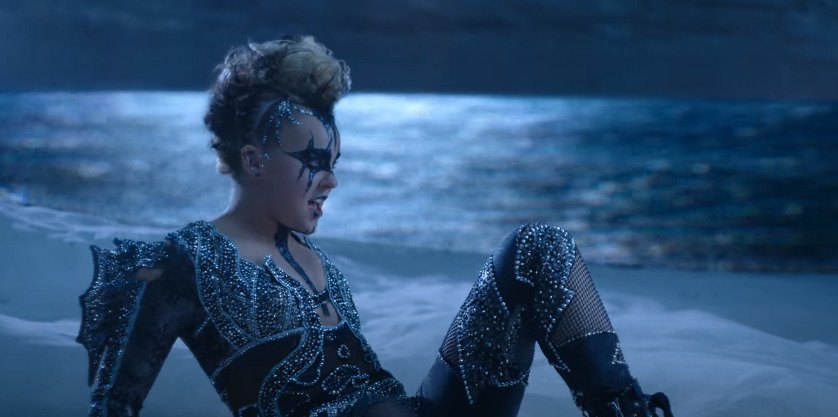Karma JoJo Siwa: JoJo Siwa, once famous for her youthful exuberance and glittery bows, has recently made waves with the release of her single, “Karma.” It marks an abrupt transition away from child-centric persona towards more sophisticated adult style music; “Karma” has caught public eye and caused considerable debate; in this blog we examine why its release caused such controversy while looking forward into what this could mean for her career development.
JoJo Siwa’s Evolution
JoJo Siwa first shot to prominence via reality television show Dance Moms and later Nickelodeon. Known for her high-energy performances, colorful outfits, and signature hair bows – Siwa quickly established herself as an inspirational role model among young audiences. However, as she has aged, Siwa has expressed the desire to move away from being defined solely as child star image that defined her career trajectory.
Release of “Karma”
“Karma,” released April 5, 2024, marked Siwa’s attempt at transitioning into adulthood. Accompanied by an impressive music video co-directed by herself and featuring bolder fashion choices as well as more mature stories with deeper, more intricate themes than her prior kid-oriented content, “Karma” showed an entirely new side of Siwa that contrasts sharply against earlier offerings by this singer/actress/director/creator/performer.
Visual and Musical Development
“Karma” marks Siwa’s visual and musical development over her early years to young adulthood. In it, she can be seen wearing a silver two-piece outfit adorned with rhinestones–hot pants and vest–evoking her love of sparkle while maintaining an adult aesthetic. Most strikingly absent in this video is her iconic hair bow from earlier days that had to be given up when approaching adulthood.
Controversy Over Origins
This song leans heavily toward pop with edgy undertones, reflecting its title’s themes of revenge and empowerment. However, critics have pointed out that its lyrics and production don’t match Siwa’s maturity ambitions.
One major point of contention surrounding “Karma” is its origins – that the track wasn’t originally composed by Siwa herself but recorded and released first by lesser-known artist Brit Smith and produced by Rock Mafia songwriting and production duo in 2012. Recently, Brit Smith’s version, entitled “Karma’s a Bitch,” quickly went viral on TikTok and reignited interest in Siwa’s original rendition, prompting Smith herself to release their take.
Siwa denied these allegations of “stealing” Smith’s version and stated it is common practice among musicians to share songs before being released for public release; nonetheless, these allegations cast a shadow over her release and caused some fans and critics to doubt her credibility.
Reaction and Outrage
Siwa’s performance of “Karma” has received mixed reactions and public backlash since it first debuted. While some fans applaud her efforts at reinvention and exploring different artistic directions, others were less forgiving; YouTube views quickly shot past three million dislikes for this video alone! Incredulously, Siwa even celebrated this unwelcome statistic on TikTok as evidence she could boast about having defeated Taylor Swift somehow!
Critics have also expressed displeasure with Siwa’s music video’s choreography and execution, particularly its execution as seen on “Karma.” Her moves in it have been described by critics as awkward and unrefined while many viewers have pointed out how her backup dancers outshone her performance which raised further queries into why Siwa is less polished when dancing than expected.
Siwa’s Vocal Performance
One aspect of “Karma” that has received widespread scrutiny is Siwa’s vocal performance. She has often spoken publicly of her love of music; however, many critics question her vocal abilities over time. Listeners believe her heavily auto-tuned voice detracts from its authenticity when combined with mature themes presented within its lyrics; an opportunity missed for Siwa to showcase genuine growth as an artist.
Siwa has long faced criticism of her earlier music; although popular among younger fans, critics were never entirely won over by it. With “Karma”, however, expectations were that Siwa would rise to the challenge and show her growth as an artist; unfortunately though, her heavily processed vocals and straightforward lyrics left many unimpressed with what was on offer.
Controversial Comments on “Gay Pop”
As JoJo Siwa prepared to release “Karma,” she made headlines for comments she made regarding creating a genre called “gay pop.” Siwa first came out as part of the LGBTQ+ community in 2021 and has made no secret about wanting her music to express that identity; yet her remarks regarding gay pop were met with both confusion and criticism from listeners and audiences alike.
Many fans and critics pointed out that LGBTQ+ representation in music was nothing new: artists such as Elton John, David Bowie, Freddie Mercury as well as Lil Nas X and Sam Smith had long since pioneered “gay pop.” Unfortunately the backlash stemmed from perception that Siwa either misunderstood or dismissed these trailblazing artists’ contributions.
Siwa later clarified her statement by not implying she invented the genre but instead wanted to play an active role in its continued growth and visibility. Unfortunately, some individuals viewed Siwa’s remarks as out-of-touch with LGBTQ+ representation in music history, leading them to accuse her of ignorance regarding this important history and representation issue.
Lessons Learned and the Path Forward
JoJo Siwa’s transition from child star to adult artist has not been an effortless one. Although “Karma,” her latest single intended to announce this transition as more mature performer has made this clear; its release has provided evidence that this evolution still needs time to happen and its subsequent controversy have exposed all the difficulties surrounding redefining Siwa’s public persona.
However, Siwa should take note that she’s far from alone when it comes to struggling to make this transition as former child stars have experienced similar hurdles while trying to establish credibility as adult artists. Now the question arises as to whether Siwa can learn from this experience and refine her approach on future projects.
What Is the Significance of JoJo Siwa’s Song “Karma”?
JoJo Siwa’s “Karma” signifies her attempt at transitioning from child star to adult artist and has caused much debate due to its mature themes, mixed critical reception and accusations of inauthenticity.
Why did “Karma” by JoJo Siwa generate such strong dislike?
Karma attracted significant dislike due to various reasons, including its origins, perceived lack of authenticity, autotuned vocals and an underwhelming video in terms of choreography and execution.
Who originally recorded “Karma”?
Brit Smith, an obscure artist at the time, first recorded it back in 2012. Rock Mafia wrote and produced it while Timbaland produced her version; but Smith never officially released theirs until JoJo Siwa released theirs two years later in 2024.
What was the controversy behind JoJo Siwa’s statement regarding her desire to create “Gay Pop?”
JoJo Siwa caused quite an uproar when she announced her intentions of creating this new genre; critics pointed out the longstanding history of LGBTQ+ representation within music; their comments seemed to overlook earlier artists whose contributions can only be appreciated when considering Siwa’s statements alone.
How has JoJo Siwa responded to criticism surrounding “Karma”?
Although she acknowledges criticisms levelled against “Karma”, Siwa remains proud of what she has created and continues to develop as an artist – “Karma” being just the first step on that journey of exploring more mature themes through music.
What can we expect in JoJo Siwa’s future music career?
While “Karma” did not meet all her hopes and aspirations for success, it represents an important stepping-stone on her artistic path. Moving forward, Siwa can refine her approach further while becoming an artist themselves – perhaps winning back some fans who were disappointed with this release.

